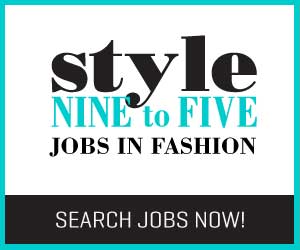
We’re back with Style Nine to Five Founder, Christie Lohr, and the answers to her most frequently asked career questions. Part 1 covered changing industries, employment gaps, careers during COVID, salary negotiation, and advice for grads. Let’s check out five more popular Q&As that share Christie’s expertise.
1 – I have a decade of experience but no degree. How do I get in the door for an interview?
You might think that you need to have attended fashion school or have a university degree to get a job in fashion, but this is a common myth. Sure, having a degree looks good on paper, but work experience often speaks louder when you’re applying to a new position. On your resume, focus on your years of experience, the various duties you’ve done during your career, what you bring to the roles you’ve worked in, and the hard skills you’ve picked up along the way.
If you want to oomph up the “Education” section of your resume but don’t have a degree to mention, consider upgrading or brushing up on some of your hard skills and listing the latest courses you’ve taken. For example, you might not have learned Adobe Illustrator in fashion school, but there’s no reason why you can’t do an evening or weekend course to learn the basics and list that on your resume. Chances are, hiring managers will be impressed to see that you’re continuing to grow and learn.
Degree or not, no matter where you are in your career, you should never overlook the power of networking. Go to events and hand out business cards. Read fashion publications and get in touch with the writers to say that you loved their latest article. Grow your LinkedIn network by reaching out to common connections or sending a personalized message to people who work at the companies you want to work for. It’s kind of like dating – you’ll never meet anyone if you’re sitting home alone. Networking lets other people in the industry know who you are and this helps keep you top of mind when these people are looking to fill upcoming positions.
2 – If a company is hiring for more than one position, should I apply to only one?
There may be several roles up for grabs at a company you love, but this isn’t a time for what one of Christie’s follower calls “resume spray,” where you send a blast of applications out for a variety of jobs at one company. Choose the one position that really fits your skills and career objectives and apply to that one only.
It’s tempting to put your name in the hat for multiple roles, but Christie thinks that this has a spammy feel to it. “While hiring managers appreciate the interest, focus on one position that you’re best suited for. In your cover letter you could mention that you’re open to other opportunities they feel you would be a good fit for, as working for their company is a goal/dream for you and that you’re flexible and open,” Christie says.
3 – How do you apply to a job in another city and have the company take your application seriously?
It’s true that many hiring managers will push resumes aside when they see that the applicant lives in another city. After all, who knows how serious they are about re-locating or when they’re planning on doing it. As an applicant, your best bet in this situation is to be upfront and specific about your plans to move.
At the top of your resume, you’ll want to put the name of your city and province or state (or country if applicable). Then, you want to finish that section off by spelling out exactly when you’re re-locating or what your plans are.
Christie featured a great example of this on one of her recent Instagram Stories where an applicant’s resume header said:
Jane Doe
Toronto, ON – moving to Vancouver in October 2020
This gives hiring managers a clear picture of your availability and how serious your are about finding a job in another city, and it removes the guesswork when they’re reading your resume and wondering what your plans are.
4 – What’s a great cover letter opener?
Writing a great cover letter can be daunting. Before you know what to do, let’s brush up on what not to do. This includes things like:
• Not addressing it to the right person. “Dear Sir or Madam,” or “To Whom It May Concern,” are old-school and out of date. If you don’t know the person’s name, just write “To the Hiring Manager of Lululemon,” for example.
• Using the same cover letter for every job and company you apply for. Hiring managers can spot this a mile away. Using generic language and simply saying, “Please find my resume attached. I look forward to hearing from you” is not going to cut it these days.
• Repeating all the details of your resume in your cover letter. Each of these documents serve different purposes – hiring managers will see all of your experience, education, and duties on your resume, while your cover letter is a chance to show your personality.
Now, let’s talk about what you should do. A cover letter is your chance to shine and show them who you are as a person, so hopefully (along with your resume) it sparks the hiring manager’s interest and leaves them wanting to get to know you more. This means getting personal, showing your enthusiasm, and expressing why you want to work there.
Christie likens a good or bad cover letter to greeting cards. “I always say it should be like you’re writing a birthday card to a friend. Compare that to getting one from your dentist with a bland, basic message – it’s not memorable at all, “ she says. “Focus on how excited you are to be applying. What about the company or position speaks to you? Do you have a personal connection with their products that you can tie in?” Include those details in your cover letter and you’ll have a major advantage over the applicants who go with a generic approach.
5 – How many times should I follow up after sending my application?
You’ve sent in a flawless resume and kick-ass cover letter. But then, nothing. Of course you’ll want to follow up with the hiring manager, but you also don’t want be annoying. How many times is overkill?
According to Christie, it’s, “Max three times…for now. The company has most likely read your email but they don’t have the time to respond, something about your application package didn’t align with them, they want to reply but, like me, are flooded with messages. It doesn’t mean you have to let it go forever. Maybe just give it a rest for a little while and revisit it again,” she says.
Some things you can do to give your follow ups a better shot? Avoid copy-paste syndrome where you send the same generic email over and over. Keep your messages short but personalized, mentioning your specific interest or re-stating how excited you are to learn more about the opportunity. After that, it’s out of your hands, but you can feel good knowing that you did the best that you could with that application.
Still wondering about job-seeking? Christie offers an Ask 1 Career Question service that allows you to email her with a question that you want her expert advice on. You’ll get the answer you’re looking for and the proceeds go towards an educational sponsorship to help someone advance their career skills.
By: Jeanine Gordon – Jeanine is a freelance writer and editor with a passion for creating stellar content for global brands and small businesses alike – specializing in fashion, beauty, and lifestyle.

